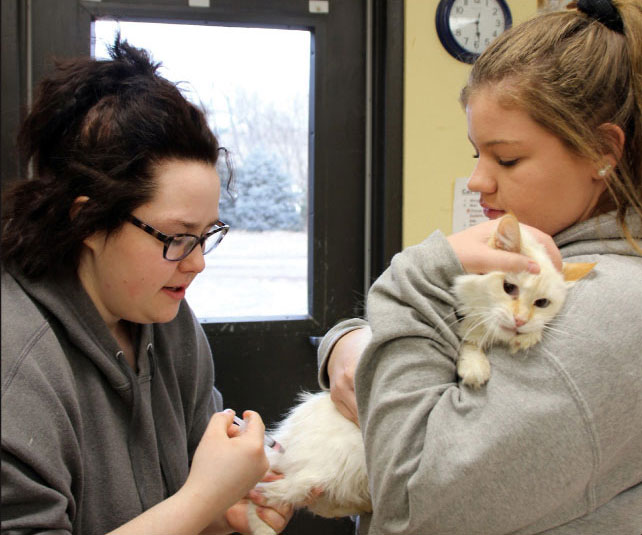
Northwest Technical School has increased the courses of study available including veterinary science.
By Kathryn Rice
To support the growing interests of high school students in the healthcare profession, the Health Sciences class at the Northwest Technical School has increased the courses of study available, including veterinary science.
In its third year, Health Science Instructor Bing Boettner said the program has grown from one student the first year, two the second year, to nine students this year.
Boettner has utilized ed2go.com which offers a six-to-eight week online course led by a veterinarian for the students to gain the background information necessary. Clinicals are provided by Nodaway Veterinary Clinic, Francis Veterinary Services, Southpaws Veterinary Clinic and the New Nodaway Humane Society Animal Shelter.
“It provides a good background for students because the teacher is speaking the language they need to know in clinicals,” Boettner said about the online course.
She explained the nine students in the vet course must be motivated and self-starters since Boettner acts in a supervisory role, rather than a day-to-day instructor. She provides a canine model and materials for the students.
She appreciates the hands-on experience the students receive from the veterinarians during their clinicals. Nodaway Vet Clinic is the main site for the students’ clinicals.
The animal shelter lets the students come during the morning before it is open. The animal shelter staff gives booster vaccinations and worms dogs and cats. The staff also looks for signs of illness in the animals. If necessary, the staff consults with Nodaway Vet as its attending veterinarian.
For SkillsUSA, three of Boettner’s students are putting together a presentation on animal abuse. The students are being assisted by the animal shelter’s Director Wendy Combs and other members of the shelter’s staff. The students are incorporating the “trash puppies,” three-week old puppies found by a trash collector, into the presentation.
Besides the addition of the vet unit, the certified nursing assistant or CNA program has added a dementia component. Boettner feels that giving students the principals involved in dementia care can be applied to all aspects of patient interactions.
Any caretaker and patient relationship benefits, Boettner said, from respect, being able to think from another person’s point of view, safety and professionalism by the caretaker.




Facebook Comments